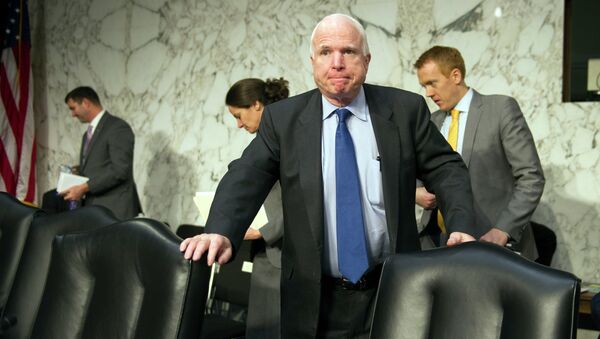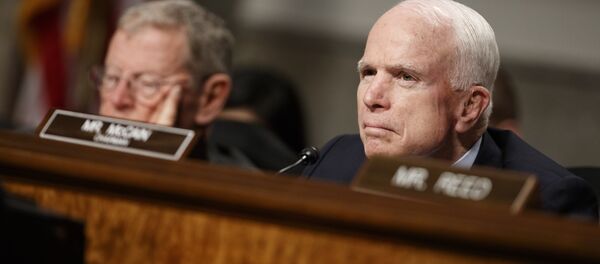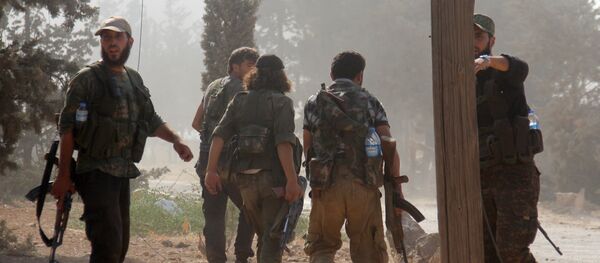US Senator John McCain has recently dubbed Russia a key player in Syria. However, there is more to this statement than meets the eye, according to Dmitry Egorchenkov, Deputy Director of the Institute for Strategic Studies and Prognosis, at the Peoples' Friendship University of Russia.
"He [President Vladimir Putin] is now a major player in the Middle East. There's nothing more significant than the Russians, the Iranians and the Turks inviting the US to come to a peace conference," McCain told new channel MSNBC on Tuesday, commenting on the upcoming Syria peace talks in Astana.
"The US isn't leading, the US isn't even part of it but they're 'being invited.' How far we have come," he said bitterly.
Indeed, speaking to MSNBC McCain has repeatedly accused Russia and its leadership of the attempts to "restore the Russian Empire."
Asked whether Donald Trump could "use Russia" in order to "counter China" and to fight against Daesh (ISIS/ISIL), McCain said that this strategy wouldn't work since Russia and the US have different priorities.
"Vladimir Putin's priority is to restore the Russian Empire, okay, that's what they are," the US Senator, well known for his anti-Russian stance, claimed.
As if that were not enough McCain agreed with the groundless allegation that Russia and its leadership "pose a greater threat to the US than ISIS [Daesh]."
However, McCain's irritation is understandable, Egorchenkov believes.
"Russia has become an important player in a number of regional processes," the Russian academic stressed, explaining that Middle Eastern realms respect powerful and influential political actors.
"Russia has demonstrated both military and diplomatic strength by bringing various Syrian opposition groups to the negotiating table… and engaging such regional players as Turkey and Iran in dialogue," he underscored.
"Obama has managed to quarrel with almost all America's regional allies, including Israel and Saudi Arabia," he stressed, "This also allowed Russia to score political points and gain the upper hand by becoming the main co-sponsor of the Astana peace negotiations."
Egorchenkov envisions that the "Astana format" could eventually become the main negotiation ground for Syrian peace talks.
"There is hope that Russia, Turkey and Iran will convince the warring parties — the Syrian government and opposition fighters — to at least communicate with each other. I believe that eventually Astana will become a real center of decision making during the Syrian crisis settlement, while Geneva will be a kind of center for formalizing these decisions," he underscored.
The first step in this direction was taken on December 20, 2016, when the foreign ministers of Russia, Iran and Turkey met in Moscow to discuss steps to revitalize the political process to end the Syrian conflict.
After the Moscow negotiations Russian President Vladimir Putin announced on December 29 that the Syrian government and armed opposition groups had reached an agreement on a nationwide ceasefire, paving the way for the peace talks.
Last Friday in Ankara a total of 27 opposition groups Syria inked an agreement on participation in a major peace conference between opposition and government delegations in Kazakhstan's capital Astana on January 23. The talks are expected to be followed by a new round of negotiations on Syria in Geneva on February 8.
Still, Washington has not been left out in the cold: Russian Ambassador to the US Sergey Kislyak invited the Trump administration to Syrian peace talks on December 29.
"As you know, [Trump's incoming National Security Adviser Michael] Flynn was invited in a call that he had with the [Russian] Ambassador [to the United States Sergey Kislyak] on December 29," Trump spokesman Sean Spicer told reporters Wednesday.
"I don't have anything to update you on that. But, I think, the scenario is that what President-elect is in, what's going on there [in Syria] is a major concern…We clearly have the desire to work with other countries and nations," Spicer stressed.
Never miss a story again — sign up to our Telegram channel and we'll keep you up to speed!





